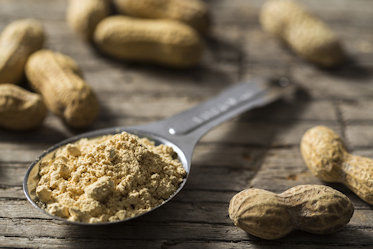|
Peanuts Are an Excellent Source of Biotin
Biotin is technically considered part of vitamin B complex, but it has also been called vitamin H in the past. Regardless of what you call it, biotin is an enormously beneficial nutrient for your physiological well-being. Biotin is involved in dozens of enzymatic reactions in the body, including processes that regulate the expression of your genes.
Preliminary research suggests that biotin could be beneficial for the treatment of multiple sclerosis, diabetes, and some brain conditions. Additionally, getting enough biotin is essential for pregnant women, as even mild biotin deficiency can significantly increase risk of congenital birth defects. It is recommended that adults aim to get 30 micrograms of biotin per day. A quarter-cup serving of peanuts contains more than 26 micrograms,
or
88% of your Daily Value (DV) for the nutrient.
Peanuts Are Chock Full of Heart-Healthy Monounsaturated Fats
Peanuts sometimes get a bad rap because of their high fat content. However, the types of fats in peanuts are actually the heart-healthy variety. For example, peanuts contain 80% unsaturated fat to 20% saturated fat, a similar profile to olive oil. The type of unsaturated fat is predominantly monounsaturated fats, which have been associated with lower cardiovascular risk. Getting plenty of monounsaturated fats in your diet promotes
the artery-clearing
process that keeps your blood flowing well and lowers your risk of heart attack or stroke.
Peanuts Contain Some of the Same Antioxidants as Red Wine
Antioxidants are a class of molecules that neutralize free radicals, the unstable molecules that can cause damage to your cells. Excessive free radical activity has been suggested as a possible mechanism for the formation of cancerous cells, meaning that getting plenty of antioxidants may lower your cancer risk.
Red wine is well known for its antioxidant activity, and it is a great source of the powerful antioxidant resveratrol. However, peanuts are another potent but lesser known source of the nutrient. In animal studies, resveratrol has been associated with increased brain blood flow, which decreases risk of stroke. Routinely eating peanuts or peanut butter can boost your resveratrol consumption, potentially harnessing its beneficial
antioxidant
power.
Eating Peanuts May Protect You Against Gallstones
As their name implies, gallstones are small particles that form in the gallbladder. Certain people are at higher risk of gallstones, including women, overweight individuals, people over age 40, and those with a diet high in calories and refined carbohydrates. In a long-term study of nurses, scientists found that eating high levels of nuts -- particularly peanuts -- lowered risk of gallstones by 25%. It is unclear what nutrients
in peanuts
help to protect your gallbladder, but eating at least one serving of peanuts per day is associated with reduced risk of gallstone formation.
Peanuts Contain Copper
Copper is a trace mineral that is considered an essential micronutrient. Although often overlooked in dietary considerations, copper is necessary for several important physiological processes. In particular, copper forms a crucial part of enzymes that govern energy production and neural activity. In the nervous system, copper is needed for neurons to create the myelin sheath that encases their axons and increases the speed of neural
transmission.
Failure to get enough copper has been associated with numerous health conditions. Even mild copper deficiency may contribute to higher risk of cardiovascular disease, while consuming sufficient amounts of copper may lower levels of harmful LDL cholesterol . Additionally, copper appears to play a role in neurodegenerative conditions such as Alzheimer’s and Parkinson’s disease. A quarter-cup serving of peanuts contains 0.42 micrograms
of copper,
which amounts to 47% of the DV for the mineral.
|

